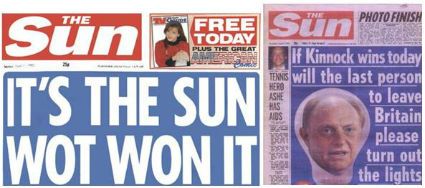Rebekah Brooks has stated that her arrest is the result of a "weak and unjust" decision. History will judge on the arrest’s judicial propriety, but I couldn’t agree with her more on the “weak” part.
Brooks, as well as both Richard and James Murdoch, appeared before the Culture, Media and Sport Select Committee nine months before being called to the Levenson enquiry. The reversal of the special access Murdoch’s editors were said to have to 10 Downing Street was ironic and possibly deliberate, the hacking scandal having been fuelled by celebrities and mushroomed to politicians and relatives of murdered children.
To appreciate why newspaper executives are being ordered to report to the Parliament of Great Britain, we need some backstory. On 8 April 1992 in the British general election, the Sun published a graphic of Labour Neil Kinnock’s head inside a lightbulb above the headline "If Kinnock wins today will the last person to leave Britain please turn out the lights". When John Major’s Conservative victory was confirmed the next day, Saturday’s headline was "It’s the Sun Wot Won It!"
Since then, conventional wisdom has it that the party backed by Murdoch’s papers will win a general election, witness the elections of Blair and Cameron. And this is what the fuss is all about: the emergence of the British electoral system from the dead hand of what was effectively a privately-owned intelligence state.
That’s why America, Australia and India, just to name three, are watching; people round the world want to see if the blossom of nation-state democracy can survive the choking nettles of new modes of fascism that eschew political apotheosis for the puppetmaster’s prerogative.
And that’s why Rebekah Brooks’ arrest is weak. Rupert Murdoch should be in her place, in a cell, awaiting trial for treason.
Gerry Dorrian
300 words

No comments:
Post a Comment